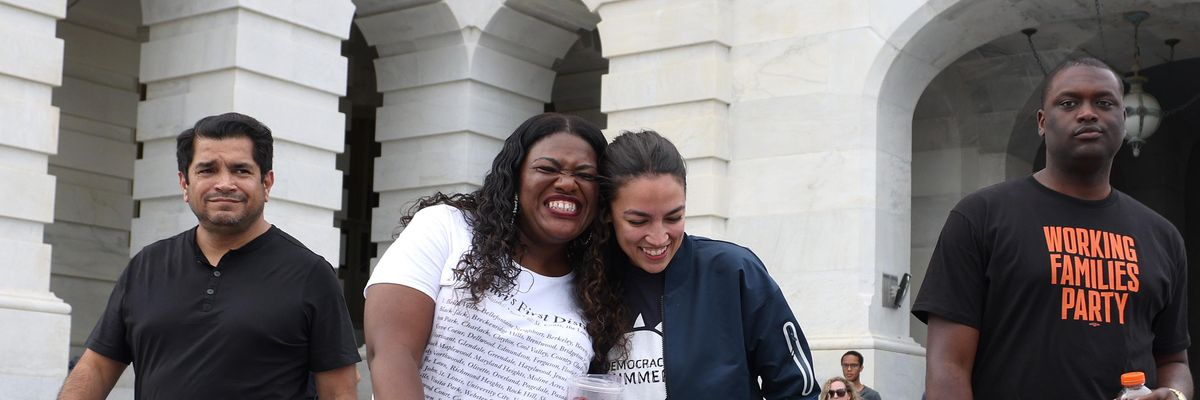Progressive policies are popular. Progressive candidates are winning. But you would not know that after the establishment takeover in the op-ed pages and political pieces following former state Sen. Nina Turner's (D) loss in the Ohio special primary election.
Turner lost her primary earlier this month to Shontel Brown, with the latter pulling a come-from-behind victory in a race where Turner once held a comfortable lead, fueled in large part by massive outside spending and a heavy dose of petty personal politics. Predictably, the status quo pundits proclaimed that progressive politics can't win, or, at the very least, progressive candidates cannot win. Articles and opinion commentary declared it a "reality check" moment for the left, and there's no need for President Biden to cave to the progressive wing of the party.
Establishment actors are already hard at work selling their snake oil to swing-seat Democratic candidates--pushing them down a path to powerlessness.
As we approach the 2022 midterms, prepare to be served more centrist "reality checks" insisting that, to maintain their majority in 2022, Democrats must play it safe and distance themselves from bold stances on the environment, immigration and public safety. But what's the reality that's being checked here? Ohio's 11th Congressional District, covering urban turf from Cleveland to Akron, is one of the bluest seats in the country. Turner's loss was in a special election in August--by definition, an exceptional election circumstance. This district's results are by no means a good indicator of what we are up against in 2022.
To no one's surprise,
establishment actors are already hard at work selling their snake oil to swing-seat Democratic candidates--pushing them down a path to powerlessness. They want us to cozy up to corporations and break up solidarity among workers. They
want us to ignore the deep racial injustices and disparities coded into our nation's DNA. In wide swaths of the country, establishment Democrats ceded meaning-making on race to the nationalists now overrunning the Republican party, letting them fashion
people who don't look like them into villains and boogie monsters.
It doesn't have to be this way. Progressives are building infrastructure to win primary and general elections in places Democrats forgot about years ago. Many of these districts will be the battlegrounds for key fights of our time around immigration, public safety and the climate crisis.
But this won't be a cakewalk. While we've built out a progressive bloc in Congress, laying the groundwork for candidacies like Sen. Elizabeth Warren (D-Mass.), to Rep. Ilhan Omar (D-Minn.) and Rep. Cory Bush (D-Mo.), these victories have almost always been in safe, blue seats. Only three Progressive Caucus members are running competitive general elections: Rep. Andy Kim (D-N.J.), Rep. Katie Porter (D-Calif.) and Rep. Mike Levin (D-Calif). This presents progressives with a problem: Politicians like Rep. Abigail Spanberger (D-Va.) and Sen. Kyrsten Sinema (D-Ariz.) hold the balance of power in their respective bodies. They are viewed as "majority-makers" by caucus leadership, corporate media and Washington consultants--giving them carte blanche to sacrifice bold action in favor of weak leadership. Our communities rightly feel cheated, and their votes squandered. Something must give or else we risk being the long-term minority party in this country.
We need to run progressive champions in Republican-held swing districts.
The progressive movement agenda knits people in America together while the right-wing and corporate elite rip us apart. If Democrats want to govern for a generation instead of winning one-off races by slim margins, we will need to mend the deep tears among the American electorate and reckon with the injustices that were sewn into the fabric of our flag.
That's why we need to run progressive champions in Republican-held swing districts. We are aggressively identifying and recruiting potential candidates for the U.S. House and Senate in competitive races. And we are engaging the entire Democratic field in districts without a clear progressive leader to better align candidates with a bold, positive vision that addresses issues our communities care about.
But even the best candidates with the strongest platforms cannot win elections alone. The right is already inundating voters with
fear-driven messaging on immigration, policing, and the "economy vs. environment" dichotomy. To counter these vicious attacks, we must talk with voters in Republican-held districts, inoculate them against these viral messages, and move them towards a positive vision for a government that cares for all of us.
People's Action, where I serve as director of movement politics, runs the largest rural organizing project in the country. We've been deep canvassing for years in many areas where establishment Democrats gave up on, so we know a thing or two about changing hearts and minds.
The progressive agenda is popular, and our candidates can win. And when we lose one race, it's a lesson about power--about organizing money and people everywhere to fight. Turner's loss was tough for the movement, and we will respond not with mourning, but with organizing.

